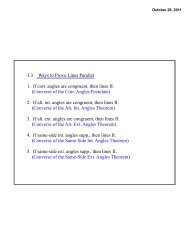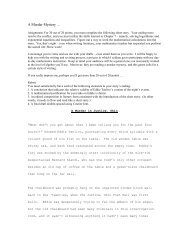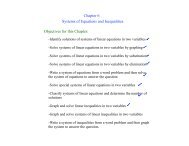DOCUMENTS: THE ITALIAN RENAISSANCE
DOCUMENTS: THE ITALIAN RENAISSANCE
DOCUMENTS: THE ITALIAN RENAISSANCE
You also want an ePaper? Increase the reach of your titles
YUMPU automatically turns print PDFs into web optimized ePapers that Google loves.
11. Naturally he must excel, but should avoid seeming to do so; above all, he must cultivate<br />
grace of movement, and this Castiglione thought could only be achieved by the practice of<br />
sprezzatura, nonchalance, “so as to conceal all art and make whatever is done and said appear to<br />
be without effort and without almost any thought about it.” Polish was as necessary as prowess,<br />
in exercises of the mind as well as the body. The gentleman was, of course, literate,<br />
knowledgeable about the classics, and eloquent . . .<br />
After the mind and body came sensibility, connoisseurship. According to Castiglione, a<br />
gentleman might even be taught to paint - as, indeed, the Greek and Roman aristocrats had been.<br />
Music and its appreciation were necessities; music composed the mind, directed thought to<br />
gentle pleasures, inculcated a love of harmony . . . The lighter expressions of art as well as the<br />
weightier were proper pastimes - dances, masques, the parade of rhetoric, and, naturally, the<br />
pursuit of love (love, however, not lust). The conquest of the heart, the possession of the mind,<br />
were a courtier’s targets . . .<br />
J.H. Plumb, The Italian Renaissance (1961)<br />
12. . . . (Men) are ungrateful, changeable, simulators and dissimulators, runaways in danger,<br />
eager for gain; while you do well by them they are all yours; they offer you their blood, their<br />
property, their lives, their children . . . when need is far off; but when it comes near you, they<br />
turn about . . .<br />
For a man who, in all respects, will carry out only his professions of good, will be apt to be<br />
ruined amongst so many who are evil. A prince therefore who desires to maintain himself must<br />
learn to be not always good, but to be so or not as necessity may require . . .<br />
Is it better to be loved than feared, or feared than loved It may be answered<br />
that one should wish to be both, but it is much safer to be feared than loved<br />
when one of the two must be chosen. Men on the whole are ungrateful,<br />
fickle, false, cowards, covetous. As long as you succeed they are yours<br />
entirely . . . Men have fewer scruples in offending one who is beloved<br />
than one who is feared, for love is preserved by the link of obligation which,<br />
owing to the baseness of men, is broken at every opportunity for their<br />
advantage, but fear preserves you by a dread of punishment which never<br />
fails . .<br />
Nevertheless, a prince should inspire fear in such a way that if he does not<br />
win love, he avoids hatred; because he can endure very well being feared<br />
while he is not hated, and this will be true as long as he abstains from<br />
taking the property of his subjects or his women. But when it is necessary<br />
for him to take the life of someone, he must do it with proper justification<br />
and for manifest cause, and above everything he must keep his hands off<br />
the property of others, because men more quickly forget the death of their<br />
father than the loss of their heritage . . .

















